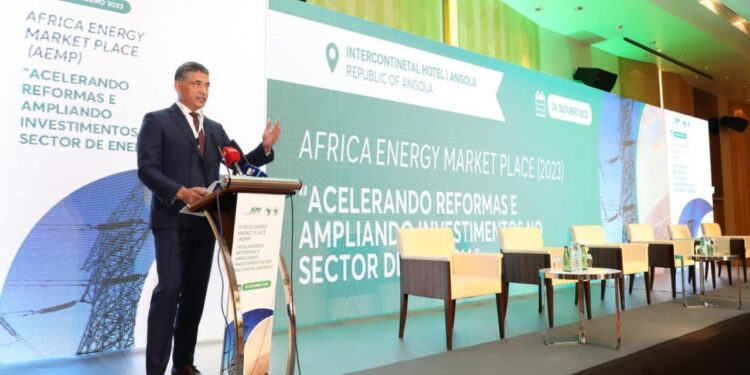On Thursday, June 20, 2024, in Macau, Minister of Energy and Water João Baptista Borges emphasized the Forum’s value as a platform to promote major Energy and Water sector projects, facilitating collaboration with financial institutions and engagement with government representatives from the People’s Republic of China.
Full Speech by the Minister:
Your Excellency Mr. Ho Iat Seng,
Chief Executive of the Macau Special Administrative Region, People’s Republic of China;
Distinguished Representatives of Diplomatic Missions and International Organizations accredited to the People’s Republic of China;
Esteemed Mr. Fang Qiuchen,
President of the China International Contractors Association;
Executive Directors and Senior Officials from Public, Private, and Financial Institutions,
On behalf of the Angolan government, I would first like to express our sincere thanks for the invitation to participate in the 15th Edition of the International Infrastructure Investment and Construction Forum (IIICF) in Macau/China. This year’s theme, “Green Innovation, Digital Connectivity,” brings together business leaders from Angola and China, enabling both nations to explore avenues for shared social and economic progress, underpinned by a deep tradition of friendship and cooperation.
Secondly, I commend this initiative, which plays a pivotal role in strengthening China-Angola relations. It comes at an especially significant time, marked by the recent visit of the President of Angola to China on March 15. This visit resulted in several key agreements, including the Agreement on the Promotion and Reciprocal Protection of Investments—a framework aimed at fostering economic cooperation, capital investment, and development between our two countries.
Your Excellencies, Ladies, and Gentlemen:
Today, the world faces immense challenges in areas such as energy transition and security, water security, innovation, climate change mitigation, food security, artificial intelligence, demographics, electromobility, and sustainable urban development. These are critical areas for economic, scientific, and business collaboration between Angola and China, involving both public and private sector engagement.
China is a vital strategic partner for Angola, significantly contributing to our country’s development in sectors like dam construction, water supply, roads, ports, airports, railways, technology centers, and schools. One noteworthy project is the ongoing Caculo Cabaça Hydropower Project, which aims to generate 9,000 MW by 2027.
China’s advanced technical and technological expertise has proven highly beneficial to African nations, particularly in the areas of infrastructure and connectivity. This is exemplified by the Belt and Road Initiative, which has accelerated industrialization across Africa, contributing substantially to the achievement of Africa’s Agenda 2063 for sustainable development.
Distinguished Entrepreneurs,
Less than a year ago, Angola celebrated 40 years of diplomatic relations with China, marking a milestone in our close cooperation. Since the end of the civil war, China has been a key partner in Angola’s national reconstruction, and its investments remain crucial to the Energy and Water sectors.
Angola’s 2023-2027 National Development Plan, in line with Long-Term Agenda 2050, aims to achieve a total installed energy capacity of 9,000 MW by 2027 and an electrification rate of 60%, requiring an investment of USD 23.02 billion. The involvement of the private sector and financial institutions will be instrumental in reaching these targets, presenting opportunities for project financing, direct Chinese investment, public-private partnerships, and technology transfer.
Though Angola’s electricity sector is currently dominated by public investment, the private sector is well-positioned to capitalize on emerging market opportunities, given Angola’s industrial potential, regional economic integration, and domestic consumption demand, supported by a population of about 36 million.
Angola’s energy potential is extensive, with environmentally sustainable and clean sources providing an estimated capacity of 60 gigawatts, including 18 gigawatts from hydropower and 17 gigawatts from solar energy. Additionally, Angola has around 900 trillion cubic meters of natural gas reserves, offering the potential to generate 17 gigawatts of electricity.
In line with Angola’s commitment to a market-based economy, the private sector is expected to lead the diversification of the national energy mix. We strongly encourage private investment in energy production, transmission, distribution, and commercialization concessions, as well as public-private partnerships and joint ventures. Angola’s legal framework, supported by the Private Investment Law, the Public-Private Partnerships Law, the Tax Benefits Code, and the Competition Law, is increasingly favorable for such investments.
Beyond energy, the Angolan government remains committed to achieving Sustainable Development Goal (SDG) 6, with increased investment in water supply and sanitation infrastructure.
Over the 2023-2027 period, Angola plans to invest over USD 4 billion in the water sector, with new systems for water extraction, treatment, and distribution that will increase national supply by 1,149 cubic meters per day, particularly benefiting Luanda. This initiative will connect 1.6 million families to the water network.
These efforts will increase per capita water consumption from 40 liters per day to 70 liters per day, bringing Angola closer to its SDG targets. Furthermore, the government has developed a Drought Mitigation Program for Southern Angola as part of its broader climate change resilience strategies.
João Baptista Borges João Baptista Borges João Baptista Borges



